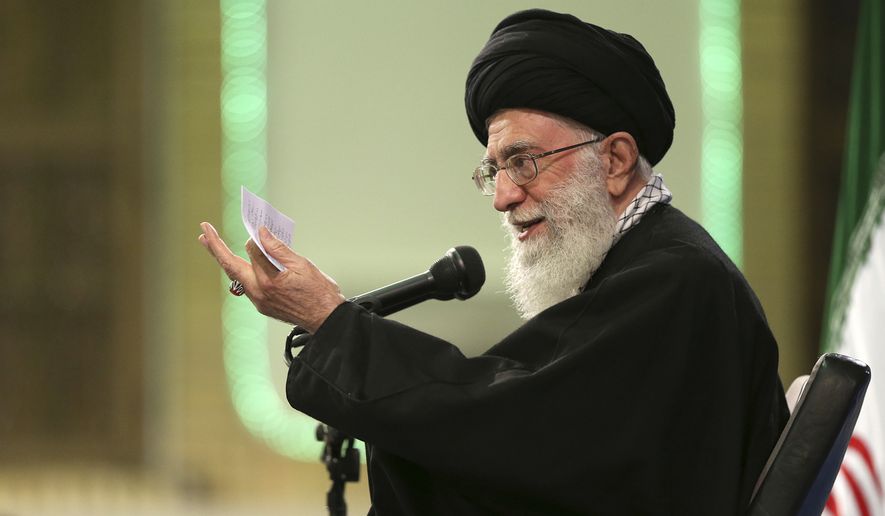The U.S. and Iran are still sparring over whether and when economic sanctions will be lifted in the wake of a nuclear deal, but some of Tehran’s traditional trading partners aren’t waiting for the gates to officially swing open again.
Turkey’s president traveled to Tehran last week for meetings that produced eight accords on commercial and industrial cooperation. China is preparing a deal to build a long-delayed natural gas pipeline between Iran and Pakistan, to start once sanctions are eased. A trip by India’s commerce minister to Iran last week produced an invitation for Indian Prime Minister Narendra Modi to visit for a state dinner to discuss expanded economic ties.
Russia became the latest — and most controversial — country to seek economic deals with Iran when President Vladimir Putin said Monday that he was lifting the ban on a long-stalled $800 million missile agreement.
Then there are Iran’s vast oil holdings that are bottled up because of the sanctions.
“When [Iran’s oil industry] is opened up, if it is opened up, this will definitely change energy markets globally,” Paul Sullivan, an economist at the National Defense University, said in a forum on the fallout from a potential deal last week.
Already, many countries are clamoring for a piece of the Iranian economy.
SEE ALSO: Russia shields Iran from airstrikes, puts Obama nuclear deal in political peril
Real estate developers and financing banks in Dubai, such as Damac Properties Dubai Co. and Dubai Islamic Bank PJSC, for example, are making plays for Iranian properties. Dubai will get a 5 percent boost to its economy from lifting sanctions on Iran, according to Hasnain Malik, the head of frontier-markets equity strategy at Exotix Partners LLP in Dubai.
“Banks and real estate companies could see a commensurate impact in terms of value of deposits or trade finance and property purchases,” Mr. Malik said.
Turkey never officially cut off economic ties with its neighbor, choosing instead to pay for Iranian gas in precious metals such as gold as a way of avoiding international sanctions. Ankara is biding its time in hopes that Iranian trade will help lift the country out of its economic doldrums.
Turkey’s net gold exports increased to $2.58 billion this year from $398 million in 2014, according to central bank data, suggesting that much of the increase is a result of Turkey’s growing dependence on Iranian fuel.
Tupras Turkiye Petrol Rafinerileri, Turkey’s sole crude refiner, also may benefit handsomely from Iranian oil in the event that a nuclear deal is struck this year, according to Global Securities.
Shares of Tupras have shot up 9.2 percent this year, and Turkish companies see opportunities in Iran’s underdeveloped consumer and industrial sectors.
“In some sectors, we had 600,000 [metric tons] of exports to Iran before sanctions against the country took effect,” Turkish Iron and Steel Producers Association Secretary-General Veysel Yayan told the Turkish newspaper Zaman. “With sanctions in place, our exports were zeroed out. The market [of steel] could be revived after the removal of sanctions.”
Stock shares also skyrocketed for Malaysian ship operating company MISC Berhad after news of a preliminary nuclear agreement. The Malaysian tanker shipper industry probably will get a boost in revenue because Iran will start exporting more crude after a deal is reached, Raymond Yap, an analyst at CIMB in Kuala Lumpur, said in an April 6 report.
A cloud still hangs over many of the early deals. Top U.S. and Iranian officials have warned that a final deal still may not be signed, and the Obama administration is demanding “snapback” provisions to reimpose sanctions if Iran is caught violating its nuclear promises. Although Iran may get relief from some trade sanctions with a nuclear accord, sanctions relating to its military and human rights record may remain in effect.
Although U.S.-Iranian trade is likely to be minimal in the early years after a deal, officials in Tehran see much more promising investment and market opportunities with major European economies. By some estimates, Iranian-EU trade, which totaled $8.3 billion last year, could quintuple within three years, according to the Reuters news agency.
“What the Iranians want is the return of major European investors — the long-term sustained investment by all the major European oil and financial companies, as well as other sectors like automotive, from British, French and German companies,” Suzanne Maloney, a senior fellow at the Brookings Institution, told The Washington Times last month.
“[But] my very strong impression is that most of the major players will move very cautiously even if they have a clear opportunity to do so,” she said.
• Chris White can be reached at cwhite@washingtontimes.com.




Please read our comment policy before commenting.